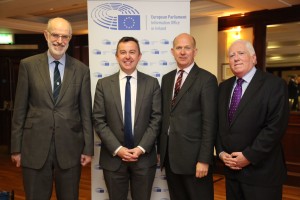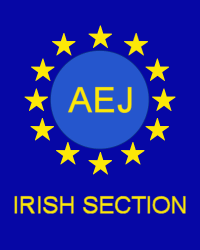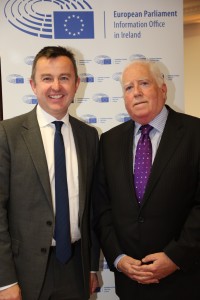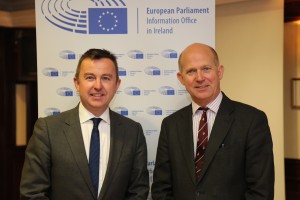Brian Hayes MEP

Brian Hayes MEP (second from left) with British Ambassador Dominick Chilcott flanked by Francis Jacobs, Euro Parliament office, Dublin, and AEJ Chairman Richard Moore.
address on Friday, 15th April, Mont Clare Hotel, Dublin 2.
“I am not convinced that there is enough contingency planning being done at government level on the Brexit referendum. There is an urgent need to put in place a stable government to prepare for the real prospect of Britain leaving the EU.
“We joined with the U.K, because we couldn’t have joined without them. The question must now be asked honestly; were they to leave now, could we stay in the EU without them? This is not some academic question. It will have to be faced in a post-Brexit environment. I’m satisfied that we could and should remain in the EU without Britain. I’m satisfied that’s it’s in Ireland’s national interest to remain. But most definitely we would need a new agreement with the EU, post-Brexit. We would also need a new agreement with the U.K.
“Failure to prepare adequately for such an eventuality would be serious dereliction of duty by all Irish politicians. There is a real danger that the present protracted negotiations on the formation of a government are distracting attention from the bigger danger ahead.
“A British decision to leave the EU will be a profoundly disruptive economic and political event – for the EU, for Britain and for Ireland. We urgently need to prepare for that outcome.
“Ireland’s decision to join the Eurozone without Britain has left us vulnerable to negative currency fluctuations involving our single most important trading partner. The immediate danger to Ireland is the euro/sterling exchange rate. The very favourable exchange rate in recent years has been an important element in the Ireland’s economic recovery.
“If Britain decides to leave the EU currency traders are predicting parity between the sterling and euro by the end of this year. Should this happen there would be extremely negative consequences for Irish exports to Britain. The competitiveness of the important tourist sector will also be hit badly by a big fall in the value of sterling; the British segment accounts for 40% of the Irish tourist market.
“After more than 40 years a member, divorce proceedings between Britain and the EU will be protracted, complex and very messy. We must not allow Ireland to be a victim of the separation negotiations that would follow. In effect Ireland will require a new agreement with both the EU and Britain in key areas, so as to ensure that we are not disadvantaged. That will be very difficult to envisage, but we badly need to think about what that deal might be and what red line issues we require.
“At this stage I can think of at least 6 red line issues:
Trade: Given the level of Irish exports to Britain in goods and services in 2015 terms is over €35billion how could we allow Europe to impose new restrictions on our trade where Britain is no longer governed by such restriction?
Financial services: We could not accept a situation where the City of London was given a free pass on EU legislation to the disadvantage of financial services in Dublin.
Border controls: The idea as some have suggested that passport controls along the border simply cannot be allowed to happen.
Energy: We have an all-island electricity market with inter connectors north/south and east/west: how would that emerging energy market be structured with the prospect of additional EU tariffs?
Climate change: Would the UK be subject to the EU greenhouse gas emission targets? If we are, with the knock-on effect it has for Irish agriculture and food production, how could we withstand additional cost to our government or industry?
Peace Funding package: If Britain leaves the EU, will the EU be obliged to continue funding the Peace Funding package for Northern Ireland?
“I raise these issues not to provoke fear but simply to start a genuine debate about what we need from all of this. We are told that contingency plans are in place. Frankly I’m not convinced that any serious contingency planning is underway. Nor do I believe that we have a plan for the potential negotiation. We need a strategy post-Brexit and the sooner that happens the better.
“And while I believe the great majority of Irish people want Britain to remain in the EU, we cannot determine the outcome. The truth is that the risks associated with a protracted Brexit negotiation are immense for Ireland. There are also opportunities, of that I am sure, but the last thing that post crises Ireland needs right now is more doubt and uncertainly.”
ENDS


